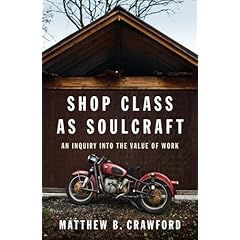http://fish.blogs.nytimes.com/2009/06/14/fathers-sons-and-motorcycles/?scp=4&sq=motorcycle&st=cse
Here is an exerpt regarding ZAMM
Pirsig’s book is an extended meditation on philosophy, rhetoric and fatherhood. The narrative follows a long motorcycle journey the author takes with his son and two friends. Another main character (present only in thought and imagination) is named Phaedrus. He is at once Pirsig’s alter-ego, a questing philosopher of daunting and destabilizing intellect, and the foil of Socrates in the Platonic dialogue that bears his name.
The philosophy Pirsig and Phaedrus wrestle with is a variant of the holism associated with phenomenology and with thinkers as diverse as Merleau-Ponty, Michael Polanyi, Martin Heidegger, Donald Schön, Thomas Kuhn, Erving Goffman and the later Wittgenstein (with Kant in the background). Different as they are in many respects, these philosophers share a conviction that knowledge of the world cannot be achieved by inventorying its discrete parts. Rather, they contend, the world must first be conceived or assumed whole and entire (don’t ask how) and the emergence of its parts and the possibility of describing them then follows.
Pirsig’s example is describing the parts of a motorcycle, an exercise that has no natural stopping point. But, he insists, no matter how much data the exercise heaped up, true comprehension would still not have been achieved, for the motorcycle “so described is almost impossible to understand unless you know how it works.” Rather than building up from particulars to generals (the empiricist method), you must begin with generals — with an in-place, intuitive awareness of what motorcycles are for, of what can go wrong with them, of what can go right with them — and within that tacit knowledge you will know where to direct your analytic attention. You can’t just begin with analytic attention, with “mere” or “pure” observation, and expect to get anywhere; you must already, in a sense, be there.
The problem is that once the parts or facts are made to appear, they seem to possess an independence, and it is (literally) tempting to rest in them and to believe that they are the foundation of things. (In theology this mistake is called idolatry.) “The division of the world into parts,” says Pirsig, “is something everyone does,” but in doing it, “something is always killed” — and what is killed is an awareness of and contact with the world before analytic thought has done its (necessarily) reductive work.
If we think of the world as a handful of sand sorted into separate piles, there are, Pirsig tells us, two ways of understanding it. “Classical understanding is concerned with the piles and the basis for sorting and relating them” while “romantic understanding is directed toward the handful of sand before the sorting began.” But (and here’s the rub) the handful of sand is only known as something that exceeds the sortings we have made of it; the whole world can never be grasped directly, and so we are always in danger of occupying ourselves with the wrong things. “What has become an urgent necessity,” Pirsig announces (he is hardly the first in history to do so), “is a way of looking at the world that does violence to neither of these two kinds of understanding and unites them into one.”
A tall order and Pirsig’s efforts to rise to it literally drive him crazy and lead him first to disengage from his family and then to undertake this journey in the hope that both his relationship with his son and the fractured pieces of his thought can be made whole.
The rest is about a father and son building a Vincati which of course is a Vincent and Duc.
Threewheelbonni I agree , although there are a few gems in the book. Its about an hour of reading per gem, I estimate. Overall, I think ZAMM is a waste of ink.




